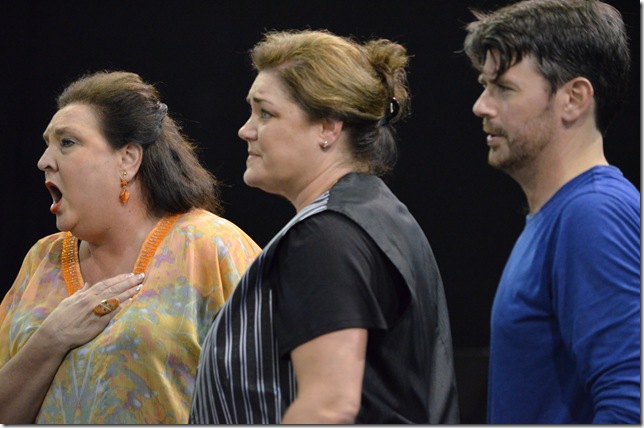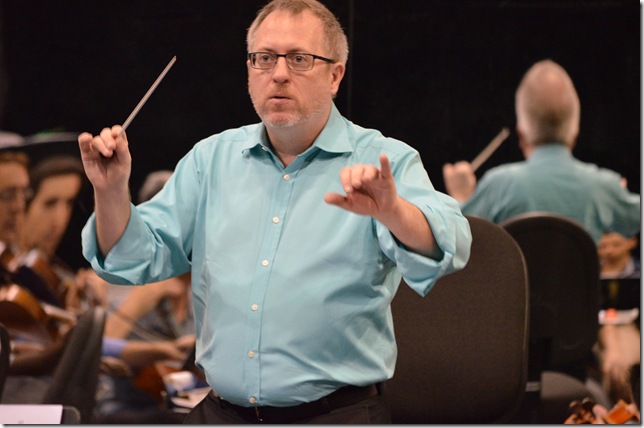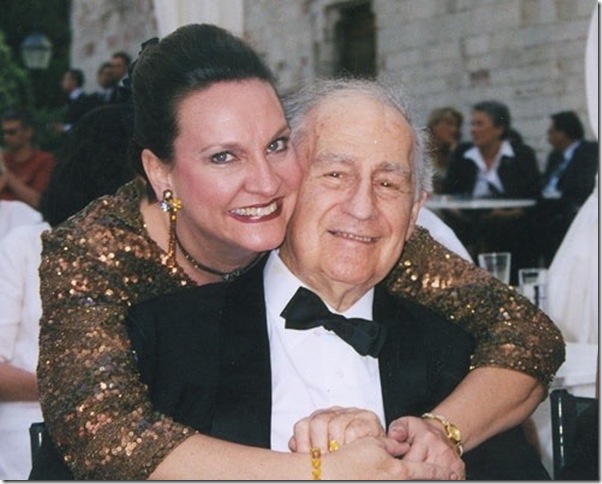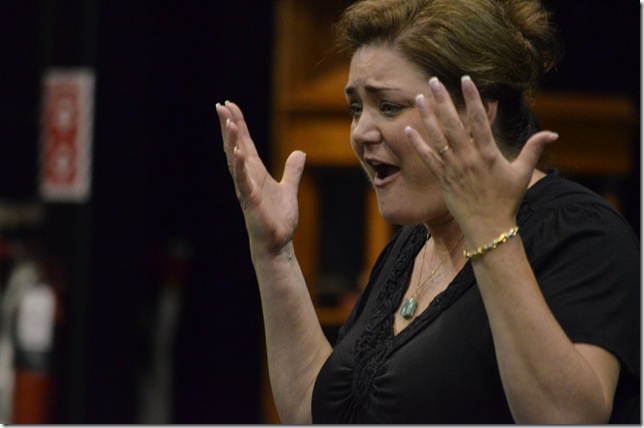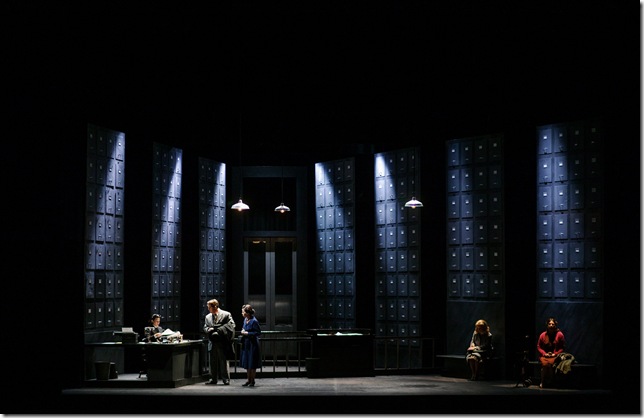Victoria Livengood first discovered the power of Gian-Carlo Menotti’s opera The Consul as an 18-year-old student at the University of North Carolina.
Having received a full vocal scholarship after auditioning for the choir to fill an hour elective in what was supposed to be a pre-law curriculum, she came home to Thomasville one weekend to show her parents the first song she’d been assigned by her vocal teacher, which was “I shall find for you shells and stars,” the mother’s lullaby from Menotti’s 1950 opera.
She sat down at the piano to perform the aria, and found her biggest fans.
“I turned around and the two of them were weeping,” Livengood said. ”And my dad was getting out his checkbook.”
Although her subsequent career as a mezzo-soprano took her around the world singing Carmen (a role she sang 250 times), it’s only now, at 55, that Livengood has gotten to sing the role of the mother for the opera, which concludes Florida Grand Opera’s current season beginning Saturday at the Ziff Ballet Opera House.
“Since I’ve switched my rep, these past two seasons have been among the most rewarding I’ve had in a decade,” she said, explaining that she has transitioned from mezzo roles such as Carmen and Delilah to character roles such as the “Verdi hags,” as well as roles in Donizetti’s La Fille du Régiment, Poulenc’s Dialogues of the Carmelites and Klytemnestra in Strauss’s Elektra. “The one thing on my wish list that I haven’t done yet is [Stephen Sondheim’s] ‘Sweeney Todd.’ I’ve got to have that next.”
The Consul was a Broadway smash in the 1950 season, and the first full-length opera by its creator, who ended up writing 25 operas in his long career (he died at age 95 in 2007). Menotti would follow The Consul with his 1951 opera for television, Amahl and the Night Visitors, a Christmas piece that remains a popular seasonal work for small community houses and university programs.
The Consul, for which Menotti wrote his own libretto as was his practice, won a handful of prestigious awards, including the Pulitzer Prize for music, the New York Drama Critics Circle Award and a Tony Award, no doubt in part because its story fit the paranoia of its Cold War time very well.
The story takes place in an unnamed Eastern European country in the mid-20th century. Magda Sorel’s husband, John, is a dissident who is being chased by the secret police. Magda goes to the consulate of a nearby country to get permission to emigrate, but is constantly put off from seeing the consul by mountains of paperwork and an officious secretary, who also keeps the other would-be emigrants waiting in the consul’s office at bay.
In the meantime, John and Magda’s baby son, who is being cared for by John’s mother, dies, and the mother not long afterward. Magda continues to try to see the consul, and ultimately John comes out of hiding to be with her, and is detained by the secret police. Now alone, without husband, child or mother, Magda turns on the gas jets in her apartment and kills herself, even as the phone — perhaps from the consul’s office — begins to ring.
FGO’s production, which will be given five times at the Ziff Ballet Opera House at Miami’s Arsht Center, will feature soprano Kara Shay Thomson (who sang Tosca for FGO last season) as Magda Sorel, and baritone Keith Phares as John. The secretary is sung by mezzo Carla Jablonski, the secret police agent by bass Tyler Simpson, and the magician by tenor Jason Ferrante. Stage direction is by Julie Maykowski, FGO’s director of artistic administration, and the conductor is Andrew Bisantz.
Bisantz, who led shows at FGO for a decade as its resident conductor, is music director of the Eugene Opera in Oregon and also has conducted operas at Boston Lyric Opera, Wolf Trap and the Virginia Opera. Long familiar with The Consul’s better-known arias, he’s finding much to admire in the full score.
“One of the things that’s been interesting to find in the rehearsal process is just how dramatically taut the piece is,” Bisantz said. “It started life as a more abbreviated version than it ended up, and he added and modified throughout the years. What’s fascinating to see is how he kept going at it to make sure every bit of music was important, that every bit of music really highlights the drama of the story and focuses the drama of the story.”
Menotti’s language is in the Puccinian tradition, though much more astringent, but there’s still a danger of overdoing it, Bisantz said.
“What’s important about his music is not to over-romanticize it. Because when he writes melody, it’s so lush and gorgeous that you don’t need to gild the lily,” he said.
The late critic Samuel Lipman once wrote that Menotti, a native of Italy who moved to the United States for study at the Curtis Institute in Philadelphia, got a hard time from other critics because his style was authentically in the old Italian tradition, and not borrowed for ironic purposes. And composer Ned Rorem, who was not a fan of Menotti’s late work, nevertheless credits him with reviving interest in American opera beginning in the 1940s with works such as The Medium and The Consul.
“He gets a bit of a bum rap, because if someone wanted to be negative about it, would say that he’s just too conservative. But I would say that he’s much more interesting in melodically telling, in the operatic tradition, the best story that he could,” Bisantz said.
“But I don’t think he’s ever going to be out of the repertoire. And the thing about ‘The Consul’ to think about is that it’s actually getting more of a revival now from professional companies than it did 15 or 20 years ago,” he said. “The composers from the mid-century are being looked at with a fresher eye, because toward the end of the last century, they were considered too neo-Romantic and not all that worth investigating.
“Well, as it turns out, they really did know what they were doing, and one of the things that strikes me as I rehearse this score on a daily basis is the amount of craft he had as a composer. It’s really pretty astonishing,” he said.
Livengood worked with Menotti for years, singing the role of the secretary in The Consul for him at Italy’s Spoleto Festival, which he founded, and later recorded it for a Richard Hickox-led account of the opera in 1998 for the Chandos label. She treasures the memory of her collaborations with the composer.
“He became for me a kind of grandfather figure. First, I was in awe of him, and bowing down and worshiping him, as a young singer would, but then we became very connected emotionally, first through ‘The Consul’ — that was my first piece in Spoleto with him — and then he continued to invite me back every summer,” Livengood said. “And then we delved into ‘The Medium’ together, and that took me on another journey, and I grew more close to him during that process.”
In fact, she said, Menotti was in Monte Carlo at the time of his death in February 2007 because he had gone there to see Livengood in the Opéra de Monte-Carlo’s production of The Medium, and passed away on the eve of the first performance.
Menotti was interested in performers who could bring out the power of the text, she said.
“He always hired actors who were good singers, rather than great singers who could act a little,” she said. “That was very important to him. He wanted the right balance. I found him a dream to work with. He directed me many, many times, and even though he was older and couldn’t run around the stage and show you what he wanted, he was amazing at just talking with you and delving into the honesty of the character: ‘What are they thinking here? What can you relate to in this moment?’”
In The Consul, the mother is a beaten-down woman who has suffered much in her life, but nevertheless is focused on ultimate redemption, singing that “I believe that God receives with kindness the empty-handed traveler.” Livengood said FGO began rehearsals of the opera with a table read, which she found “very helpful,” because it helped her build a backstory that included a specific idea about where the home action of the opera takes place.
“What we came up with is that most likely we’re in (the mother’s) house. As singing actors, you need to have a reality about what you’re doing, so you need to know where you are,” she said. And she also needed to know why the mother dies.
“I decided that I actually die of a broken heart,” she said, referencing a time in her own life when her mother became seriously ill after her father was in a coma on life support. “If you have so much sorrow that it’s unbearable, you can actually die from it. It helps me play the whole scene in a different kind of weighted-down way.”
Keith Phares, who sang the role of Orin Mannion in FGO’s revival of Marvin David Levy’s Mourning Becomes Electra last season, has a different challenge in singing John, whose fate drives the action of the opera, but whose time on stage is limited to the beginning and end of the work. In an email, Phares wrote about the motivations of his character.
“I’m trying my best to show my love and empathy for Magda, my mother, and my son. So much of John’s text is focused on ‘the goal’ and his ‘plan’ that he comes across as self-centered, thoughtless and grandiose. He seems so self-absorbed that he’s in denial about the fact that his family is already in grave danger.
“When he finally arrives at the consulate, one of the first things he says to the secretary is ‘Haven’t you ever heard of me?’ He’s not the most sympathetic character in the world,” wrote Phares, a Juilliard Opera Center graduate who has appeared in a good deal of contemporary opera.
“That being said, he DOES come back, despite the fact that he knows he’s probably going to be arrested, and I think this is his redemption,” Phares wrote. “I’m trying to take advantage of the space (in which I’m not singing) to connect with my family; otherwise, his coming back wouldn’t make any sense to me.”
For these performances, FGO is using the Seattle Opera’s production from last year, which features a striking set design by David P. Gordon in which the consul’s office is an oppressive metallic chamber with gigantic filing cabinets stretching from floor to ceiling.
“It’s just a brilliant-looking production … that puts you in the frame of mind of ‘Oh, God, everything’s bearing down on me,’” Bisantz said. “So I think the audience will feel the piece as well just enjoying it as a piece of theater or a piece of music.”
And while arguably surveillance in today’s world is far more insidious than it was in the days of filing cabinets and rotary phones, the larger point is that The Consul could apply to almost any time in the long, sad chronicle of how “men withhold the world from other men,” as the words of The Consul’s best-known aria, Magda’s “To this we’ve come,” memorably puts it.
“It’s not about the dehumanization that bureaucracy provides; it’s about dehumanization in general,” Bisantz said. “Every individual in that consulate has some wonderful and horrible history that they’re dealing with in their life, (but) the secretary says, ‘Your name is a number. Your story is a case.’”
And it remains for the stories of the sufferers in this opera to remind viewers how easy it is for society to be inhuman.
“It has everything in it that people go to at the movies, when they want to go to a movie and be completely entertained,” Livengood said. “It does have moments when you will smile or giggle. It does have a few of those moments, and then it has the moments when it will tug at your heartstrings and make you cry. And you will leave the opera changed, affected by it.
“You will think about it for days to come. To me, that’s a great piece of art.”
The Consul will be performed at 7 p.m. Saturday, 2 p.m. Sunday, and 8 p.m. May 12, 15 and 16 at the Ziff Ballet Opera House, Adrienne Arsht Center for the Performing Arts, 1300 Biscayne Blvd., Miami. Call 800-741-1010 or visit fgo.org for tickets, which start at $21.
